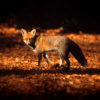 The recent period of hot weather in Britain could almost be described as Mediterranean, so this turned my mind to thinking of the ancients and the way they described these sultry spells as the ‘Dog Days’. This term came into general acceptance in Rome, where the people attributed the oppressive weather of summer to the influence of Sirius, which they thought of as the Dog Star, because Sirius is the largest and most prominent star in the constellation Canis Major, or the Greater Dog. Aristotle had spoken of the Dog Days before the Romans adopted the notion, but this is by the way.
The recent period of hot weather in Britain could almost be described as Mediterranean, so this turned my mind to thinking of the ancients and the way they described these sultry spells as the ‘Dog Days’. This term came into general acceptance in Rome, where the people attributed the oppressive weather of summer to the influence of Sirius, which they thought of as the Dog Star, because Sirius is the largest and most prominent star in the constellation Canis Major, or the Greater Dog. Aristotle had spoken of the Dog Days before the Romans adopted the notion, but this is by the way.
The Romans viewed the Dog Days as an evil time, so they attempted to counter these malevolent effects during rituals known as the Robigalia, when they would sacrifice a brown dog in an attempt to appease an agricultural deity. The Romans and their magical practises that were designed to avert evil and to bring fertility have long since vanished into the dusty pages of history, to be replaced by a technology that many of us regard as literally magical – the Hubble Telescope can gaze into the furthest reaches of the Universe, other telescopes stare into the heart of our Sun, robot probes are busy inspecting the surface of Mars, while others orbit around one of Saturn’s distant moons and still others are headed for Pluto, at the outer limits of our Solar System.
We have fantastically sophisticated monitors aboard satellites flying around our own planet that can detect fluctuations in the Earth’s gravity, while myriad other machines in space gaze down at our Earth measuring the ice, the rainfall and many other aspects of the globe that nurtures us in an attempt to better the lot of humanity and the creatures that cling precariously to its surface. And yet, and yet…
The savage spirit of the Dog Days remains with us. We live in times when some politicians in Britain are literally obsessed with dogs, believing that in the 21st century, the pursuit and subsequent ripping apart alive of wild animals by packs of dogs is entirely compatible with our status as a modern, civilised nation. Not only that, but they believe that such violence can be justified on the grounds of the pleasure it provides for those who choose to participate in this appalling minority pastime. We live in what is nominally a Christian nation, but the spirit of the Dog Star lives on, presiding over the highest level of governmental considerations, because we now have a Minister for Hunting and Shooting.
It defies belief that we can live in times of instant communications between continents, space flight, laser surgery and scientific wonders such as the Haldron Collider, yet still have an official, high level and influential appointment for an activity that should by rights be regarded as a ghastly curiosity from the Dark Ages. However, the barbaric spirit of the Dog Star not only continues to wield its baleful influence over the highest in the land, but amazingly enough, the Roman magical rituals are about to be revived in almost exact detail. The Romans condemned a brown dog to a painful death in an attempt to ward off agricultural disaster, but in 21st Britain, some people wish to exact an even more ferocious fate upon the brown fox, another canid, in the stated belief that British farmers will prosper and flourish if this bloody ritual is observed.
To this end, the pro-hunt lobby are stubbornly trying to depict the fox as a pest, even though this maligned creature is not officially or scientifically classified as such, but it doesn’t help their case that hunts all over the British Isles shamelessly used to breed foxes so as to ensure a plentiful supply for the dogs to tear apart alive in front of the exultant onlookers. Still, all the more victims for them to sacrifice upon the blood-soaked altars of the New Robigalia, I suppose.
“The blood-dimmed tide is loosed, and everywhere
The ceremony of innocence is drowned;
The best lack all conviction, while the worst
Are full of passionate intensity.”
THE SECOND COMING, by William Butler Yeats (1865-1939)






